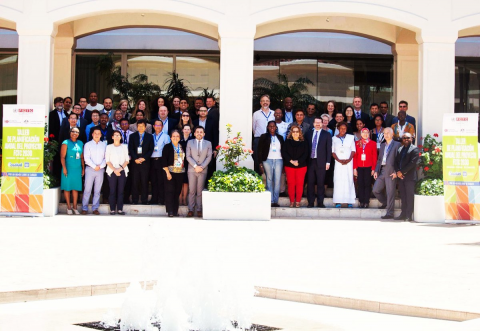
The McCabe Centre for Law and Cancer at the FCTC2030 Annual Planning meeting - 1 April 2019

The McCabe Centre for Law and Cancer was very pleased to attend the WHO Framework Convention on Tobacco Control 2030 (FCTC2030) Annual Planning Meeting from 20-22 March in San Salvador, El Salvador. Along with the Knowledge Hub on Taxation, we presented on support available to parties from the Knowledge Hubs, and took part in sessions on matching needs to resources and workplan development.
The FCTC2030 project is an initiative of the WHO FCTC Secretariat, conducted with the financial assistance of the UK and Australian governments, to support countries to implement the WHO FCTC as part of the 2030 Agenda for Sustainable Development. It aims to provide general implementation support for tobacco control in low- and middle-income countries, as well as direct support in fifteen selected countries – Cabo Verde, Cambodia, Chad, Colombia, Egypt, El Salvador, Georgia, Jordan, Madagascar, Myanmar, Nepal, Samoa, Sierra Leone, Sri Lanka and Zambia – to accelerate WHO FCTC implementation and address tobacco as a major public health concern and a barrier to sustainable development.
The meeting was opened by the President of the Republic of El Salvador, H.E. Salvador Sánchez Cerén, and hosted by FOSALUD, the Solidarity Fund for Health of El Salvador. Approximately 100 participants representing the 15 FCTC2030 countries, the Convention Secretariat, the World Health Organization, the United Nations Development Programme, the World Bank, the UK government, civil society, and academia attended. The aim of the meeting was to allow countries to reflect on progress made so far, plan their upcoming activities in tobacco control, and network with partners and other countries offering support for their work under the programme.
The meeting was an excellent opportunity to deepen our connections with FCTC2030 countries to support WHO FCTC implementation as a key component of sustainable development. McCabe Centre alumni from Cambodia, Colombia, Egypt, Georgia, Jordan, Myanmar, Nepal, Samoa, Sri Lanka, and Zambia have made valuable contributions to our International Legal Training Program, and we look forward to welcoming participants from Myanmar, Nepal, Samoa, Sierra Leone, Sri Lanka, and Zambia to our next course in May in Melbourne, Australia.
For information on the support we offer to WHO FCTC parties, including those participating in the FCTC2030 project, please see: https://untobaccocontrol.org/kh/legal-challenges/support-available-fctc-parties/





